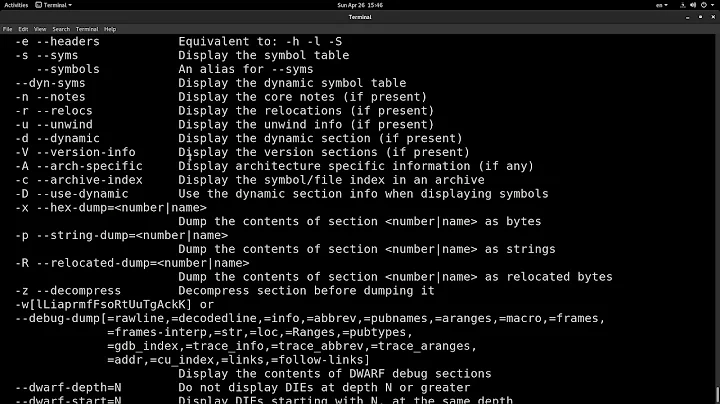Where does Ubuntu look for shared libraries?
Solution 1
This whole path business is related to something called multi-arch. Basically it's to allow you to have 32bit and 64bit libraries on the same system.
After you copied the file, did you happen to run ldconfig?
ldconfig creates, updates, and removes the necessary links and cache
(for use by the run-time linker, ld.so) to the most recent shared
libraries found in the directories specified on the command line, in
the file /etc/ld.so.conf, and in the trusted directories (/usr/lib and
/lib). ldconfig checks the header and file names of the libraries it
encounters when determining which versions should have their links
updated. ldconfig ignores symbolic links when scanning for libraries.
Solution 2
The information contained in the above question AND first (and only ATT) answer, helped me resolve *a similar * issue of mine on WSL Ubuntu (on Win10 64)!
In my case the executable couldn't find a library.
I ultimately noticed that the newly-made library got positioned in /usr/lib64 , but the multi-arch lines of /etc/ld.so.conf.d/x86_64-linux-gnu.conf did not include that directory.
So I ran
sudo ldconfig /usr/lib64
and that finally fixed it. (running it alone without the directory parameter did not make it 'magically' find the libraries BTW.) It's unclear whether 'restarting' my WSL bash helped... I think that wasn't even needed.
Related videos on Youtube
Dave Lillethun
Updated on September 18, 2022Comments
-
 Dave Lillethun over 1 year
Dave Lillethun over 1 yearWhen I run a process that links to a shared library at runtime (linked when the process starts, not linked later with
dlload()), where does it look for that shared library (.so) file other thanLD_LIBRARY_PATH?Background:
I have some C++ code that I wrote that uses a particular third-party library. I have installed the library and compiled my code on two different platforms, both Ubuntu but different versions, and different versions of gcc as well. The library was compiled and installed from source, and is located in
/usr/local/libon both platforms. When I compile my code, I link with thepkg-config --libsparameters for the third-party library and I've verified thatpkg-config --libsreturns the exact same thing on both platforms.My code compiles successfully on both platforms, and
LD_LIBRARY_PATHis not defined (or defined as empty:"") on both platforms. However, when I run it on one platoform it works fine, and on the other I get this error:error while loading shared libraries: libthrift-0.9.0.so: cannot open shared object file: No such file or directoryFunnily enough, the ones that doesn't work is the newer version of Ubuntu and gcc. :/
So I'm trying to figure out how the working one is able to locate the library, so that I can make the broken one locate the library in the same way. (i.e., without setting
LD_LIBRARY_PATH)Update:
Here's my output from
cat /etc/ld.so.conf.d/*...on the working (older) system:
/usr/lib/mesa /usr/lib32/mesa /usr/lib/alsa-lib # libc default configuration /usr/local/lib # Multiarch support /lib/x86_64-linux-gnu /usr/lib/x86_64-linux-gnu...on the broken (newer) system:
# libc default configuration /usr/local/lib # Multiarch support /lib/x86_64-linux-gnu /usr/lib/x86_64-linux-gnu /usr/lib/x86_64-linux-gnu/mesa-
 Dave Lillethun over 10 yearsSeems like it, but see my update to the OQ for the contents of those files... So it looks like it should find
Dave Lillethun over 10 yearsSeems like it, but see my update to the OQ for the contents of those files... So it looks like it should find/usr/local/lib/libthrift-0.9.0.sobut still it gives the errorerror while loading shared libraries: libthrift-0.9.0.so: cannot open shared object file: No such file or directory... Is there any reason it would not pick up a directory from/etc/ld.so.conf.d/*.conf? -
 geethujoseph over 10 yearsTry to run
geethujoseph over 10 yearsTry to runsudo ldconfig -vas suggested below. If it still does not work update your question with the output ofldd /path/to/your/application.
-
-
 Dave Lillethun over 10 yearsI ran
Dave Lillethun over 10 yearsI ransudo ldconfigand that fixed the problem! (Didn't need to recompile my code or anything...) I just want to understand, though... You said "After you copied the file," but I did not copy a file. Do you mean after I built & installed the library, or after I compiled my program? -
hookenz over 10 yearsAfter you placed it where you placed it. Basically a library cache is built. I think rebooting may also rebuild the cache.
-
 Dave Lillethun over 10 yearsI may be mistaken, but I believe I had rebooted since installing the library... However,
Dave Lillethun over 10 yearsI may be mistaken, but I believe I had rebooted since installing the library... However,sudo ldconfigdid the trick. Is this something libraries often automatically run for your as part of their install, and this one for some reason didn't? Just wondering why I don't "normally" have to do this, but did only in this case... -
hookenz over 10 yearsUsually the package install will run ldconfig during the install process I think. Maybe the version on your newer distro isn't doing it for some reason.
-
 Josh Milthorpe over 4 yearsThe same happened to me with /usr/local/lib/ . I created a file
Josh Milthorpe over 4 yearsThe same happened to me with /usr/local/lib/ . I created a file/etc/ld.so.conf.d/usr-local.confand then ransudo ldconfigwith no effect - libraries in that dir were not found by the loader. After runningsudo ldconfig /usr/local/libeverything worked fine.




